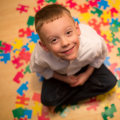There is no cure for autism spectrum disorder and there is no one-size-fits-all treatment. The goal of treatment is to maximize your child's ability to function by reducing symptoms of autism spectrum disorder and supporting development and learning. There is no cure for autism, but experts agree that the best way to manage symptoms and develop independence skills is through ABA therapy. It's important to remember that autism spectrum disorder (ASD) is a complicated condition that occurs differently in each individual.
Most experts agree that there is no cure for autism. That's why many of them approach ASD in a way that looks at managing symptoms or developing skills and support, including behavioral, psychological, and educational therapy. Psychological approaches can help people with ASD cope with anxiety, depression, and other mental health problems. Cognitive-behavioral therapy (CBT) is a psychological approach that focuses on learning the connections between thoughts, feelings, and behaviors.
During CBT, a therapist and the person work together to identify goals and then change the way the person thinks about a situation to change the way they react to the situation. Although it is a common (and the only scientifically proven) treatment for autism, ABA is not a cure for the disorder. In fact, most professionals believe that there is no cure for ASD. Currently, there is no standard treatment for autism spectrum disorder (ASD).
Can autism be cured on its own. While there is no cure for autism, there is evidence that, at least in some cases, people with ASD will naturally improve over time. Research shows that about 10 percent of patients with ASD finally show dramatic improvement by mid-adolescence. The type of treatment your child receives for autism spectrum disorder depends on his or her individual needs. In any case, of course, improvement among autism patients is well documented and, with proper treatment and support, it is a very real possibility for many people with ASD.
Each of these treatments is individualized to maximize the client's ability to function by reducing symptoms of autism spectrum disorder. Current treatments for autism spectrum disorder (ASD) seek to reduce symptoms that interfere with daily functioning and quality of life. When autism spectrum disorder ranges from mild to severe, Woods said most, if not all, treatment strategies will address and involve some form of speech therapy, behavioral therapy, and occupational therapy. Even if your child hasn't been officially diagnosed with autism spectrum disorder, he or she may benefit from certain treatments.
In addition to lifestyle and diet modifications, researchers are also looking at several other studies, such as the ability to detect autism during pregnancy, the impact its genes have on the diagnosis of autism, and the future of therapies derived from cord blood.
Read more about the idea of curing in our post discussing if autism can be completely cured.





Leave a Comment